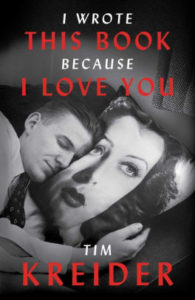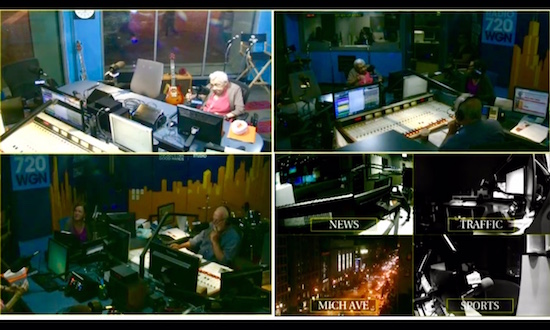Beth posted here a couple weeks ago about what her memoir-writing students wrote in response to the prompt “If you could have a guarantee that one specific person would read your memoir”. Kathy Zartman, one of her students—and our good friend—named Tim Kreider as that one person. Here’s Kathy writing about why:
“His take on his mother’s move into a retirement community, his analysis of the only hope for curbing gun violence, and his feelings when he kills, or does not kill, household ants — on all these topics he expressed, far better than I ever could, exactly how I feel.”

The cover of Tim Kreider’s recently released book.
Well, as much as I like to think I’m up on things, Kreider’s name was new to me. So I looked him up. Kreider made his name initially as a cartoonist—his “The Pain, When Will It End” series earned a large and loyal following. And he’s published a couple collections of his essays, the most recent being “I Wrote This Book Because I Love You.” And, he’s a regular contributor to the NY Times Opinionator section.
Kathy has recommended his first collection, “We Learn Nothing,” and it’s on my list. In the meantime, I’ve been working through his NY Times pieces.
Kathy is absolutely right: Kreider expresses things I feel and think, sometimes better than I could. Which, as a writer, kind of pisses me off. (Filmmaker Judd Apatow, in a blurb for Kreider’s first book, kind of sums it up: “He can do in a few pages what I need several hours of screen time and tens of millions to accomplish. And he does it better. Come to think of it, I’d rather not do a blurb. I am beginning to feel bad about myself.”)
My envy aside, Kreider is a completely satisfying read. A good example: an Opinionator essay called “Cycle of Fear” that opens with this reflection that I’m guessing a lot of you can identify with. I know I can:
Like many people, I like to set aside a few hours every day, generally between 3 and 6 a.m., to lie quietly thinking about everything that could go horribly wrong with my life and all the ways in which I am negligent and reprehensible. I have spasms of panic over things I shouldn’t have written, or, worse, things I should have; I regret having spent all the money and wonder where more money might ever conceivably come from; I wish I’d kissed girls I didn’t, as long ago as 1985. I’m suddenly convulsed with remorse over mean things I did in middle school (I am sorry, Matthew Reeve); I force myself to choose my least favorite death (drowning).
It’s worth noting that the order in which these items preoccupy me is more or less the inverse of the order in which I ought to be worrying about them.
All of this is to set up a discussion about his bicycling in New York City. His overall point is that, although it would seem that someone who lies awake mornings in angst wouldn’t enjoy something as nerve-wracking as riding a bike in a busy city, in fact, cycling in New York is an antidote to that angst. From the piece:
Natural selection has made us hypervigilant, obsessively replaying our mistakes and imagining worst-case scenarios. And the fact that we’ve eliminated almost all of the immediate threats from our environment, like leopards and Hittites, has only made us even more jittery, because we’re now constantly anticipating disasters that are never going to happen: the prowler/rapist/serial killer lurking in the closet, a pandemic of Ebola/Bird Flu/Hantavirus, the imminent fascist/socialist/zombie takeover.
Kreider goes on to describe how riding a bike in the city puts to use his genetically programmed hypervigilance, and that’s why he loves riding—it gives him a kind of Zen state.
And I can totally relate to that state. For all of my life I’ve been an angst-ridden worrier. Sometimes it’s served me, Beth, and Gus very well. Other times it’s taken its toll, mostly on me. For most of my life, I’ve ridden motorcycles. Riding has been my escape from my angsty self on one hand, and the only time that I’m completely present in the moment. It does for me what bicycling does for Kreider. I’d go on, but Kreider has done it better:
When I’m balanced on two thin wheels at 30 miles an hour, gauging distance, adjusting course, making hundreds of unconscious calculations every second, that idiot chatterbox in my head is kept too busy to get a word in. I’ve heard people say the same thing about rock-climbing: how it shrinks your universe to the half-inch of rock surface immediately in front of you, this crevice, that toehold. Biking is split-second fast and rock-climbing painstakingly slow, but both practices silence the noise of the mind and render self-consciousness blissfully impossible. You become the anonymous hero of that old story, Man versus the Universe. Your brain’s glad to finally have a real job to do, instead of all that trivial busywork. You are all action, no deliberation. You are forced, under pain of death, to quit all that silly ideation and pay attention. It’s meditation at gunpoint.
I could not describe it better. Thanks Tim Kreider, for virtually writing my blog post for me today.
And thank you, Kathy Zartman, for the introduction.
PS Here are a couple other posts to whet your appetite.
You Are Going to Die
On Smushing Bugs




